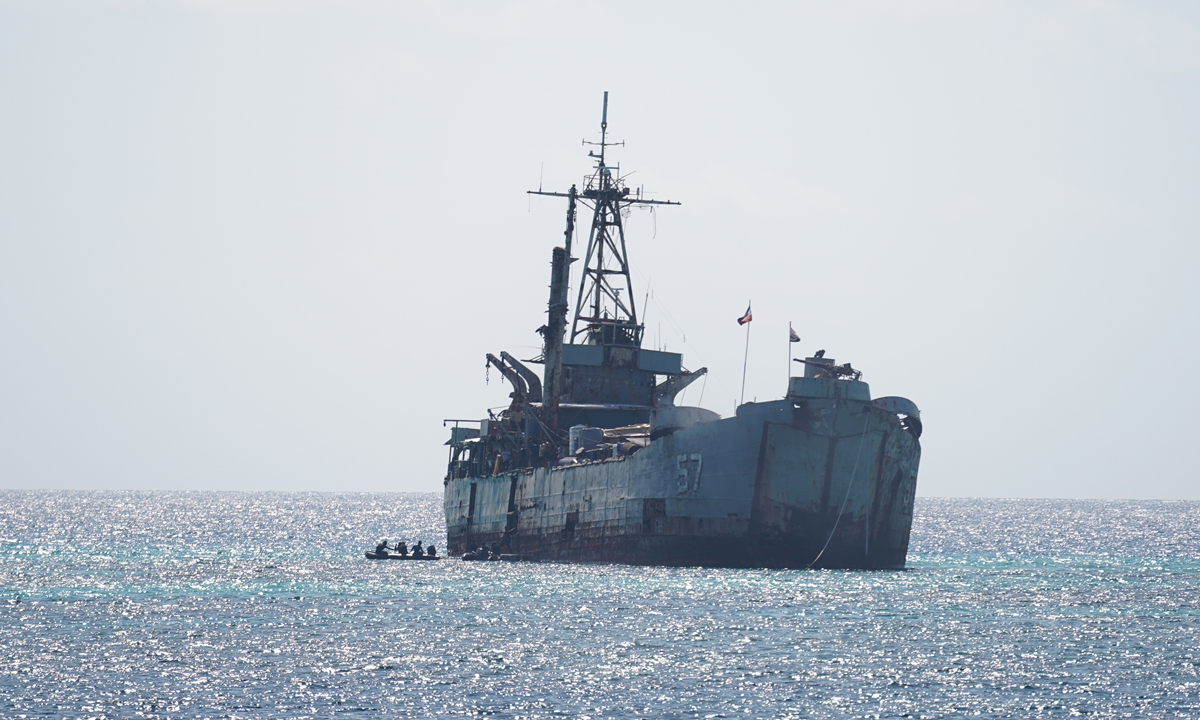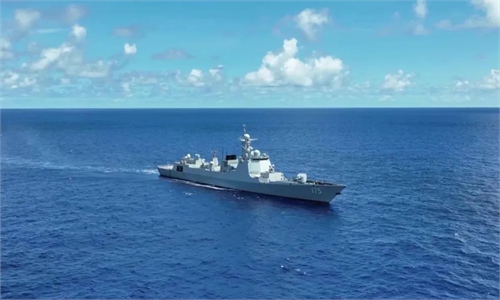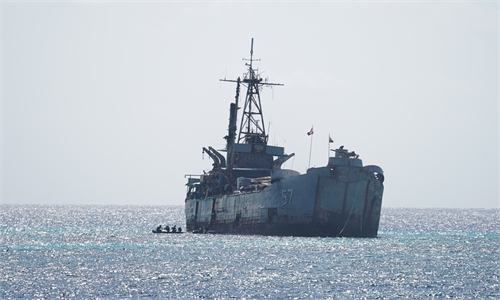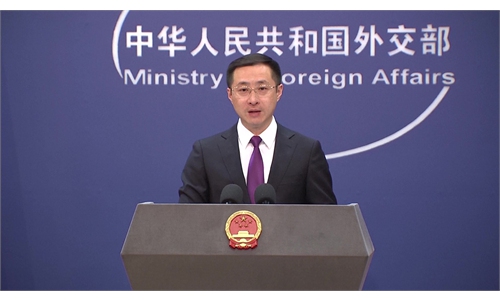Full-blown conflict in South China Sea not in US interests, say experts as US senators advise Biden to make 'visible' support to Philippines

The Philippines illegally grounded warship BRP Sierra Madre (LT-57) sent inflatable vessel to interfere with China's scientific investigation at close distance. Photo: Courtesy of South China Sea Ecological Center of China's Ministry of Natural Resources
Some US senators have been caught stoking US interference toward disputes in the South China Sea between China and the Philippines, by calling for the Biden administration to make "visible and concrete demonstrations" of support the Philippines.
Senators Jim Risch, ranking member of the Senate Foreign Relations Committee, and Roger Wicker, ranking member of the Senate Armed Services Committee, sent a letter to Biden asking that he immediately present response options to show more support to Manila, rather than just limiting their response to verbal assurances.
Observers reached by the Global Times warned that the US should not be led by political forces who's only motive is to poison ties with China and provoke regional tensions. A full-blown conflict in the South China Sea does not align with interests of the US, adding that the Philippines is not the right chess piece to move against China with.
In the US, there are long-standing political forces that view China with a deep-rooted sense of hostility. They oppose anything associated with China and push for increased pressure on the US government regarding Chinese affairs, Ding Duo, deputy director of the Institute of Maritime Law and Policy at the National Institute for South China Sea Studies, told the Global Times on Thursday.
While these senators may not officially represent the US government, we should be wary of allowing these individuals to dominate the discussion on matters concerning China, Ding said.
The assurance that if the Philippines is attacked that US mutual defense commitments would be invoked serves only as a protective carapace for the Philippines take provoke China in the South China Sea. Questions marks remain when it comes to whether the US would to become directly involved in disputes with China, and how the treaty would be invoked, observer said.
The US has repeatedly said that an attack on the Philippines would invoke the US mutual defense commitments under Article IV of the 1951 US-Philippines Mutual Defense Treaty.
The US government sees regional security issues or hotspots stemming from the advancement of American interests. The likelihood of the US taking action for the sake of certain islands or a crumbling ship on the Ren'ai Reef is minimal. For the US, stepping in to defend the Philippines against China, a major economy and nuclear power does not align with its own interests, Ding said. The US will definitely take into account the benefit the alliance defense treaty has for the US, the expert added.
The US government may wish to have more "visible" presence in the South China Sea but does the US really want to risk a direct military conflict with China? Questioned Chen Xiangmiao, director of the World Navy Research Center at the National Institute for South China Sea Studies.
"The US' real strategy is to increase the costs of China's maritime activity, alliance building , while damaging its international image," Chen told the Global Times on Thursday.
"Especially given the current presidential election, the US will not engage in direct conflict with China over these issues. From the US perspective, this level wouldn't be worth it even for Taiwan island," Ding said.
The US has been deployed its military aircraft in the Philippines, along with a host of other ambiguous gestures in addition to providing intelligence and assistance to Manila, through which, the US is merely using the Philippines to further its domination of the Pacific, observers noted.
The US desires to see tension in the South China Sea without it escalating into a full-blown conflict, this has been and will remain the US's policy in the South China Sea, Ding said.
If the situation between China and the Philippines escalates too rapidly, the US would fear losing control. Conversely, if both sides completely resolve their issues, the US would risk losing the Philippines as a strategic tool in containing China, the expert said.
In addition, experts said that invoking Article IV may not be as realistic as some think.
Legally speaking, there are strict regulations regarding what constitutes an armed conflict. The use of weapons, the targets of combat, the circumstances under which weapons are used, and who uses them, all go into determining an act of conflict. Given the current situation in the South China Sea, conditions haven't yet been met to prompt the US to invoke Article IV, Chen explained.
The territorial limits of the Philippines are defined by a series of international treaties and have been repeatedly affirmed by Philippine domestic law and associated bilateral treaties between the US and the Philippines, so from a procedural perspective, the invocation of the Article IV would have to solve these legal interpretations in advance, many of which are not solely determined by the US State Department, Ding said.
As for the overall situation in the South China Sea, observers said the temperature remains high, with the Philippines seeking to unilaterally provoke China over the past year, sparking several skirmishes and diplomatic flashpoints. There remains and elevated risk of further incidents or even escalation.
A direct line of communication between leaders' offices of China and the Philippines is set to be established, some experts believe establishing the hotline sends a signal to extraterritorial countries, including the US and Japan, that both China and the Philippines remain willing to manage the current situation in the South China Sea.
Whether this new mechanism can ultimately work depends largely on the political will of the Philippines to fundamentally resolve the conflict, as well as on coordination among different political departments within the Philippines, Chen said.



